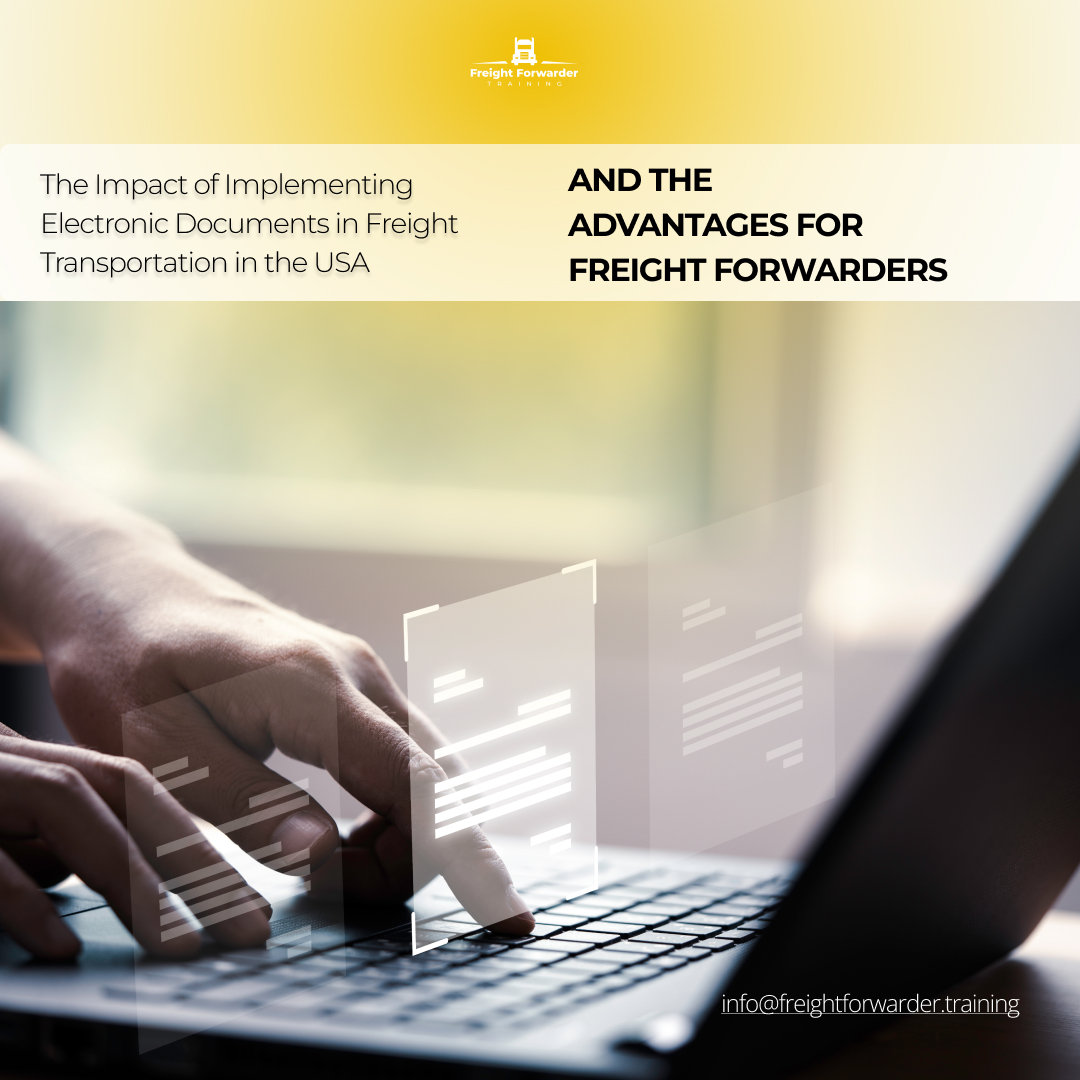The rapid advancement of technology has revolutionized various industries, and the transportation sector is no exception. In recent years, the…

The Impact of Implementing Electronic Documents in Freight Transportation in the USA and the Advantages for Freight Forwarders
The rapid advancement of technology has revolutionized various industries, and the transportation sector is no exception. In recent years, the integration of electronic documents (e-documents) into freight transportation has emerged as a transformative trend in the United States. This essay explores the changes that the implementation of e-documents will bring to the freight transportation industry and the significant advantages it offers to freight forwarders.
Streamlining Documentation Processes
The traditional paper-based documentation system in the freight transportation industry has long been associated with delays, errors, and administrative burdens. With the adoption of e-documents, the entire documentation process will become more streamlined and efficient. Shippers and freight forwarders can easily generate, exchange, and manage electronic invoices, bills of lading, customs documentation, and other essential paperwork, reducing the time and effort required for handling physical documents.
Real-Time Tracking and Visibility
Electronic documentation enables real-time tracking and visibility of shipments. Freight forwarders can access detailed information about the cargo’s location, status, and estimated time of arrival instantly. This level of transparency not only enhances operational efficiency but also allows freight forwarders to provide accurate and timely updates to their customers, resulting in increased customer satisfaction.
Cost Savings
The transition to e-documents will lead to significant cost savings for freight forwarders. Eliminating the need for paper, printing, and physical storage will reduce operational expenses. Additionally, e-documents facilitate faster customs clearance processes and reduce the likelihood of fines due to incomplete or inaccurate paperwork. Moreover, the savings on transportation costs and improved efficiency will positively impact the bottom line for both freight forwarders and their clients.
Enhanced Security and Compliance
Security is a critical concern in the freight transportation industry. Physical documents can be lost, stolen, or damaged, leading to potential data breaches or unauthorized access. On the other hand, e-documents offer enhanced security features, such as encryption and authentication, ensuring the confidentiality and integrity of sensitive information. Moreover, e-documents enable easy adherence to regulatory and compliance requirements, reducing the risk of legal issues for freight forwarders.
Environmental Benefits
The adoption of e-documents aligns with the global trend of sustainability and reducing environmental impact. The freight transportation industry is known for its significant paper consumption, which contributes to deforestation and greenhouse gas emissions. By going digital, freight forwarders can contribute to a greener and more eco-friendly future, enhancing their corporate image and attracting environmentally-conscious clients.
Integration with IoT and Automation
E-documents can seamlessly integrate with the Internet of Things (IoT) and automation technologies. This integration enables freight forwarders to gather real-time data from sensors and connected devices, optimizing route planning, and enhancing supply chain management. Automation can also expedite various processes, such as data entry and invoicing, further improving operational efficiency.
The integration of electronic documents in the freight transportation industry marks a transformative shift in how goods are moved across the USA. Freight forwarders stand to benefit significantly from this digital transformation, as it streamlines documentation processes, enhances security and compliance, provides real-time tracking and visibility, and leads to substantial cost savings. Furthermore, embracing e-documents contributes to sustainability efforts and opens the door for integration with cutting-edge technologies like IoT and automation. As the industry continues to embrace digitalization, the advantages of e-documents for freight forwarders will undoubtedly shape a more efficient, secure, and environmentally-friendly future for freight transportation in the United States.
Our latest posts
Our latest posts

The Impact of Implementing Electronic Documents in Freight Transportation in the USA and the Advantages for Freight Forwarders

Development of multimodal cargo transportation in the USA
Multimodal freight transportation plays a crucial role in modern logistics, particularly in the context of trade development and globalization. In…

The Importance of Continuous Learning and Professional Development for US Freight Forwarders
Freight transportation is one of the key industries in the United States economy. It plays an important role in facilitating…















